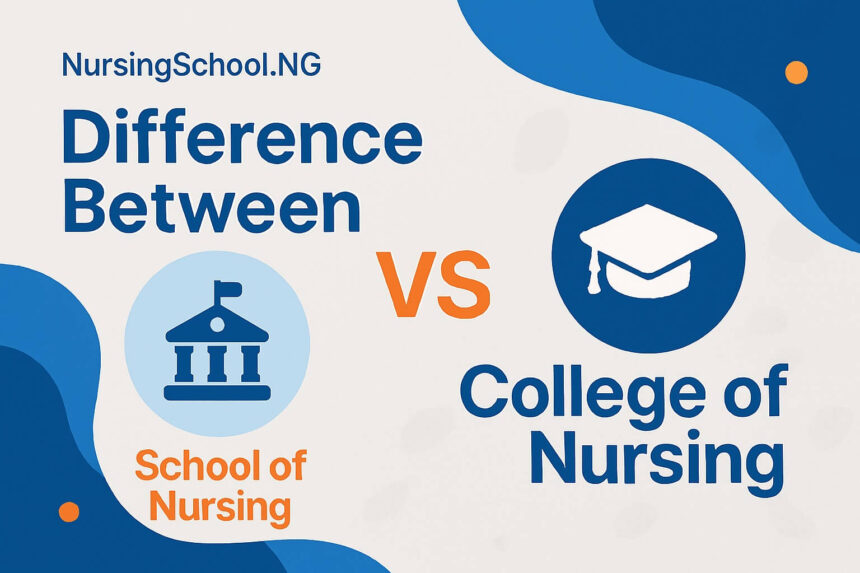When it comes to pursuing a career in nursing in Nigeria, one of the most common questions aspiring nurses ask is, “What is the difference between School of Nursing and College of Nursing?” While both institutions prepare students for the nursing profession, they are not the same. Understanding the distinction can help you make the right choice for your career path.
What is a School of Nursing
A School of Nursing is traditionally a stand-alone institution affiliated with a teaching hospital. It focuses mainly on basic nursing training and awards graduates with the Registered Nurse (RN) qualification after completing a 3-year diploma program.
Key features of a School of Nursing include:
- A 3-year training duration.
- Qualification as a Registered Nurse (RN).
- Admission through the school’s own entrance exam (no JAMB required).
- A curriculum that is mostly hospital-based and highly practical.
- Progression options such as Post-Basic Nursing, Midwifery, or bridging into a BNSc. degree through Direct Entry.
What is a College of Nursing
A College of Nursing is a more advanced institution that evolved from Schools of Nursing. It is often affiliated with universities and accredited by both the Nursing and Midwifery Council of Nigeria (NMCN) and the National Board for Technical Education (NBTE).
Key features of a College of Nursing include:
- A 4–5 year program duration, usually through the ND and HND structure.
- Award of ND/HND in Nursing alongside professional licenses such as RN, RM (Registered Midwife), or Public Health Nursing.
- Admission that requires both O’level credits and JAMB/UTME for ND entry.
- A balanced curriculum that combines classroom teaching, clinical practice, and research.
- Easier progression to a BNSc. degree, often through Direct Entry.
Major Difference Between School of Nursing and College of Nursing
Let’s dive right deep into the Difference Between School of Nursing and College of Nursing. In this section, we will highlight the key differences between School of Nursing and College of Nursing.
- The first difference is duration. A School of Nursing takes three years to complete, while a College of Nursing runs for about four to five years.
- Secondly, admission requirements are not the same. Schools of Nursing admit students through their own entrance examinations, and JAMB is not required. In contrast, Colleges of Nursing require candidates to sit for JAMB/UTME before they can be admitted into the ND program.
- Another key difference lies in the qualification awarded. A School of Nursing produces graduates with the Registered Nurse (RN) certificate only, while a College of Nursing awards ND and HND qualifications in Nursing alongside the RN, and sometimes additional licenses such as RM or Public Health Nursing.
- Finally, there is a difference in academic recognition and progression. Schools of Nursing are more practice-oriented and hospital-based, while Colleges of Nursing combine both academic and clinical training, giving graduates a smoother pathway to obtaining a BNSc. or further degrees.
Which is Better: School of Nursing or College of Nursing
Both institutions are valuable, but your choice depends on your career goals.
If you want a faster route into the nursing profession, a School of Nursing is the better option since you can qualify as a Registered Nurse within three years. However, if you are aiming for higher qualifications, broader opportunities, and academic recognition, then a College of Nursing is the smarter choice because it provides a stronger foundation for further studies and specialization.
Frequently Asked Questions
Can I study Nursing without JAMB?
Yes. Schools of Nursing admit students through their own entrance exams, so JAMB is not required. However, for Colleges of Nursing and universities offering BNSc., JAMB is compulsory.
How many years does it take to study Nursing in a School of Nursing?
- The Basic Nursing program in a School of Nursing lasts for three years.
How many years does it take in a College of Nursing?
- Colleges of Nursing usually run a four to five-year program under the ND/HND structure.
What qualification will I get from a School of Nursing?
- You will qualify as a Registered Nurse (RN) after completing the program.
What qualification will I get from a College of Nursing?
- Graduates receive ND and HND in Nursing, as well as professional licenses such as RN, and in some cases RM or Public Health Nursing.
Which one is better for career growth?
- A College of Nursing generally offers more academic recognition and easier access to BNSc. programs, but a School of Nursing remains a solid choice if your priority is to become a practicing nurse in a shorter time.
This article has clarified the Difference Between School of Nursing and College of Nursing and has made it easy for aspiring students to make the right choice based on their carrier goals. If you have questions, don’t hesitate to leave your concerns in the comments section below.

















